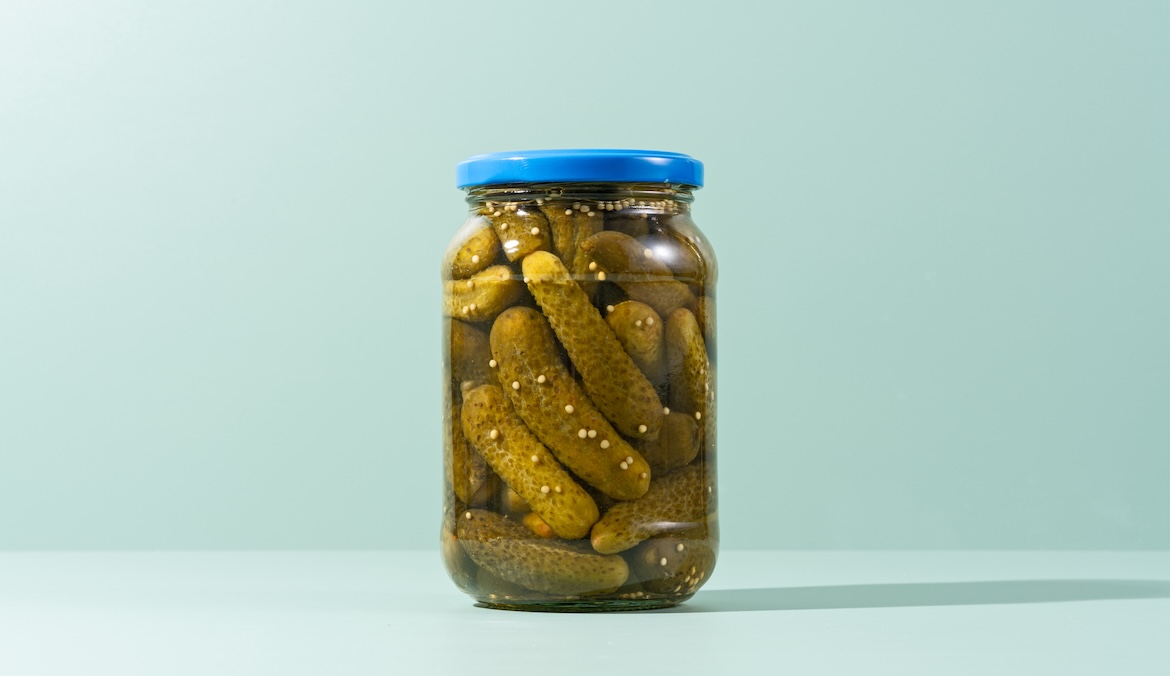[ad_1]
Believe it, friend. Turns out, the sour-salty-crunchy snack usually reserved for burgers and sandwiches can be a helpful way to soothe a sore throat. Ahead, Linda Yancey, MD, infectious disease specialist at Memorial Hermann Health System in Houston, Texas, explains why you’ll want to keep a jar or two on hand all winter long (or, for my fellow pickle lovers, find another reason to appreciate these deliciously satisfying and sour snacks even more).
Experts In This Article
- Linda Yancey, MD, infectious disease specialist at Memorial Hermann Health System in Houston
Okay…does pickle juice (or pickles themselves) help a sore throat?
Apparently, yes! It might seem strange that pickles, of all things, are able to alleviate a sore throat. But Dr. Yancey says that it all comes down to the unique properties of pickle brine. “Any time you have a solution that is more concentrated than the fluid in our tissues, such as salt or sugar, it reduces the inflammation by drawing the water out,” she shares. And pickle brine certainly fits the bill, as it’s typically 3.5 to 5 percent salt. (Your body, meanwhile, is made up of about 0.4 percent salt.)
The same logic applies to honey, a pantry staple and more well-known home remedy that has the power to help tame sore throats and even coughs, aided by its antioxidant and antimicrobial compounds.
Although this unconventional remedy can work, it’s not a one-and-done solution. “This is a minor and temporary intervention,” says Dr. Yancey. “It will bring about a small decrease in symptoms for about 10 to 15 minutes.” Though respite may be fleeting, chowing down on dill pickles or sipping up on pickle juice can be an enjoyable part of your back-to-baseline game plan—alongside drinking tea, limiting certain foods, and heeding your physician’s treatment protocol.
3 tips for using pickles to relieve your sore throat
1. Opt for salty dills over sweet pickles
“Dill pickles work [to help a sore throat] because of the salt in the pickling solution,” Dr. Yancey says. Whether you munch on whole or sliced spears, sip on the pickle juice, or both, you can anticipate the same level of (moderate) relief. But Dr. Yancey says sweet varieties (such as bread and butter and candied pickles) are unlikely to pack enough salt to do the trick.
2. Discover your own ideal quantity
As for the sweet (err… sour) spot for many pickles or how much juice will yield palpable relief, you’ll need to experiment and find what works for you. “It is more of a home remedy than a medical intervention, so there are no official recommendations,” Dr. Yancey says. For some people, myself very much included, it may be tempting to down a whole jar in one sitting—even more so for the sake of soothing a sore throat.
However, sour pickles are infamous for being high in sodium—clocking in around 768 milligrams per medium spear, or a whopping 33 percent of the daily value for adults advised by the Dietary Guidelines for Americans. (The adequate intake amounts are slashed even further for babies, infants, and children under 14 years of age.) So be mindful of how many you eat, even for the sake of lessening a sore throat—particularly if you have high blood pressure.
3. Try out other home remedies
In case you don’t have any dill pickles on hand and are in between grocery hauls, Dr. Yancey suggests making your own salt water gargle. Per the Mayo Clinic, just mix 1/4 to 1/2 teaspoon of table salt into four to eight ounces of warm water. Adults and kids over 6 can gargle the solution then spit it out.
“A spoonful of honey also works well, as does very sweet tea,” Dr. Yancey adds, which are more palatable for little ones and adults alike. Licorice root tea is also a great choice to soothe a sore throat, since licorice root has natural anti-inflammatory properties. (Just don’t drink too much of it in one day.)
While these helpful home remedies can offer relief for most, Dr. Yancey warns that they’re not suggested for everyone. “It should be noted that people on salt-restricted diets should not use either dill pickles or salt water gargles since both have a substantial salt load,” she shares. “In the same way, diabetics should avoid honey or sweet tea.” Last but not least, she says the honey hack isn’t suitable for babies under one year of age, so stick to your pediatrician’s advised regimen instead.
[ad_2]
Source link
